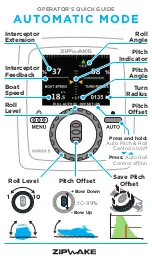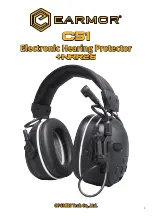
132
Operator's Manual
S 65 E - S 65 E C
CHECK FOR CORRECT FUNCTIONING OF
BALANCING ACCESSORIES
Checking balancing accessories allows the operator to make sure that wear has not al-
tered the mechanical specifications of flanges, cones, etc. beyond the specified limits.
A perfectly balanced wheel, which has been disassembled and reassembled in a different
position, should not show an unbalance value greater than 10 grams.
When a higher unbalance is found, check all the accessories carefully and replace the
components that are not in perfect condition (e.g. showing dents, abnormal wear, flange
unbalance, etc.).
Anyhow it is necessary to bear in mind that, if the cone is used to centre the wheel,
satisfactory balancing results cannot be achieved if the central hole of the wheel is out-
of-round or incorrectly centred; Better results can be achieved by centring the wheel
using the securing holes.
Bear in mind that any re-centring error made when the wheel is mounted on the car can
be removed only removed with an "on-the-vehicle balancing" of the wheel, using an on-
the-vehicle wheel balancer to complement the work of the wheel balancer.
TROUBLESHOOTING
Below is a list of faults that may occur and that the user can solve if the cause is found
among those indicated.
For any other malfunction or fault call in the technical support centre.
Machine does not switch on (monitor remains switched off)
No power at the socket.
➥
Check the mains voltage is present.
➥
Check the electrical power circuit in the workshop.
The machine plug is defective.
➥
Check that the plug is undamaged.
One of the FU1-FU2 fuses of the rear electrical panel has blown
➥
Replace the blown fuse.
The monitor has not been switched on (only after installation).
➥
Switch on the monitor by pressing the button located on the front of the monitor
The monitor's power supply connector (located on the rear of the monitor) is not cor-
rectly inserted.
➥
Check that the connector is inserted correctly.
The diameters and width values measured with the automatic
measuring devices do not match the rated values of the rims.
The sensors have not been positioned correctly during measurement.
➥
Bring the sensors to the position shown in the manual and follow the instructions
in the WHEEL DATA ENTRY section.
The external sensor has not been calibrated.
➥
Calibrate the ultrasonic sensor. See warning instructions at the end of the ULTRASONIC
WIDTH SENSOR CALIBRATION section
Summary of Contents for S 65 E
Page 69: ...Manuale d uso S 65 E S 65 E C 69...
Page 70: ...70 Manuale d uso S 65 E S 65 E C SCHEMA PNEUMATICO Alimentazione Aria 7 10 bar 100 145 psi...
Page 71: ...Manuale d uso S 65 E S 65 E C 71 Note...
Page 72: ...72 Manuale d uso S 65 E S 65 E C Note...
Page 139: ...Operator s Manual S 65 E S 65 E C 139...
Page 140: ...140 Operator s Manual S 65 E S 65 E C PNEUMATIC DIAGRAM Air supply 7 10 bar 100 145 psi...
Page 208: ...208 Manuel d utilisation S 65 E S 65 E C...
Page 210: ...210 Manuel d utilisation S 65 E S 65 E C Remarques...
Page 279: ...Benutzerhandbuch S 65 E S 65 E C 279...
Page 280: ...280 Benutzerhandbuch S 65 E S 65 E C PNEUMATIKSCHEMA Luftversorgung 7 10 bar 100 145 psi...
Page 348: ...348 Manual de uso S 65 E S 65 E C...
Page 349: ...Manual de uso S 65 E S 65 E C 349 ESQUEMA NEUM TICO Alimentaci n Aire 7 10 bar 100 145 psi...
Page 350: ...350 Manual de uso S 65 E S 65 E C Notas...
Page 351: ......
















































